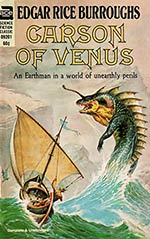
![]() couchtomoon
couchtomoon
8/22/2014
![]()
Carson is an all-around swell guy. Muscular, with sharp reflexes, he can win any fight. With a good head on his shoulders, he can wheedle his way out of a trap with calm, cool logic. His affability charms even his enemies. His good heart and moral code guide him to make the right decisions. Upright, confident, and in control, Carson has no powers in the superhero sense, but his personal advantages bring him near the pinnacle of invincibility – and when those fail him, he taps his endless supply of cosmic luck.
In Carson of Venus, book three of Burroughs' Venus series, we find Carson negotiating the unknown Venusian territory in a hover plane of sorts, accompanied by his new wife, the beautiful Vepaja princess, Duare, whom he recently rescued from a death sentence. Carson and Duare are wandering, searching for a place to settle because they are reluctant to return to Duare's kingdom where her father's wrath for stealing away his virgin daughter may result in capital punishment for them both. Instead, they encounter a series of strange native cultures: a brief encounter with a violent matriarchy that enslaves Duare, followed by a visit to a fascist kingdom led by an inept ruler, which is threatened by another fascist kingdom led by an inept ruler. Of course, Carson gets involved "to put right where once went wrong." (Sorry, random channeling of 6th grade Quantum Leap obsession. Carry on.)
I skipped the first two books of this series, which is sometimes the best avenue when sampling an unfamiliar series that might lag. Burroughs expects this, and rehashes Carson's situation by explaining his psychic mind-meld with the main character as the impetus for his stories. (This was my first encounter with an author's attempt to explain his narrative omniscience, as if his readers have never read a book and might be confused by the whole fiction thing.) Carson was headed to Mars but took a wrong turn to Venus — pulled the stick shift too hard or something. Venus is a pretty backwards place. Primitive, patchwork technology exists, almost in a steampunk sense, where bombs exist but planes don't, and the native cultures are uninformed and often unaware of one another. This lack of cohesion on the planet makes for an adventuresome time for Carson and his bride, as they flit around the planet having no idea where they are or the nature of the people they will encounter.
Bookended by irrelevant adventures with angry feminists and dull-witted pirates, the bulk of the tale concerns Carson's espionage days, pitting one fascist government against another. Now, fascism is bad and un-American, so even though Carson pledges his service to a patent dictator named Muso, the reader can be assured that the situation will be subverted (more by luck, rather than Carson's ingenuity) and justice will be restored in both kingdoms. Sort of. (They really just wind up with a new dictatorship of the benevolent type, but whatever. It is Venus, after all. Venus is weird and un-American.)
Carson leaves his dear wife in the Latin-sounding Sanara kingdom with the feeble dictator Muso, in order to infiltrate the rival kingdom of the Zanis, ruled by a paranoid and narcissistic man of short stature who demands ritualized veneration from his followers, in the form of chants, headstands, and weekly plays based on his life. Carson dallies in his espionage role for much too long, building a suspense based less on plot and more on, "Why are you so stupid, Carson? Get out of there! And why did you leave your wife with that crazy man in that other crazy place?"
But the whole point of the story is to demonstrate that the Zanis are completely wackadoodle and Muso is full of cowardly ambition. Obviously the good hero will defeat them both with his wits, and when that doesn't work, he's confident enough to act all chilled out until things just happen to work out in his favor. Which happens quite a lot.
This 1939 tale met my expectations in all respects but one: the female characters feel less like conventional damsels-in-distress, and more like modern femme fatales. Zerka, Carson's revolutionary pal, is the true hero of the Zani coup. She demonstrates genuine wit, courage, and brash, without a hint of sexual tension (although the reader may wish it). Duare is less empowered, considering she is absent for most of the story, but she does take over piloting duties, and even engages in her own fire battles with the Zanis while Carson bandies about with his prolonged masquerade.
And, in case you didn't get it, Burroughs is spoofing the Nazis and Mussolini through his portrayal of the Zanis and Muso. What's more interesting is this novel provides a cutting pop culture example of American sentiments toward the European political climate of the late 1930's. Both Muso and the Zanis are portrayed as political morons with irrational customs and paranoia, but they present little danger to our hero or society. The Zanis of this novel do not practice the legalized repression and segregation of specific groups (other than political rebels), illustrative of American ignorance/indifference to the dangerous climate of Europe.
It's not an amazing read by any account, but Carson of Venus serves as a pleasurable, if clumsy, foray into the world of late 1930's science fiction. The plot turns are silly, but suspenseful, and the romantic relationship of Carson and Duare will keep interest alive when the tale wanes.
http://couchtomoon.wordpress.com